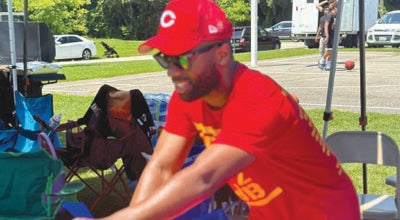A future for PUD ordinance? Farmville council asked to take a look
Published 9:29 am Wednesday, February 14, 2024
|
Getting your Trinity Audio player ready...
|
Last year, the Farmville council laid out a mission statement, a vision of how they see the town and a list of goals they want to achieve. Part of that mission statement was to “encourage diverse growth in our charming community.” To make that happen, Town Manager Dr. Scott Davis is asking the council to take another look at the planned unit development (PUD) ordinance.
“The council told staff last year that you wanted us to focus on community and land development, encouraging diverse and affordable housing,” Davis said. “We’re bringing to the table something we think can do that, it’s a tool. You might never use it.”
Davis asked the council to make a decision. Do they want to look at developing a PUD ordinance? Do they want staff to work on different options for it? Or do they want to scrap the idea?
An economic question
“We all hear that people want a grocery store (and) they want other things,” Davis said.
But the problem, as has been discussed before, is that there aren’t enough residents to attract these stores and shops. And If they want diverse housing, to possibly attract younger residents and build for the future, then that means trying new things, Davis argued.
“We should be a multi-generational livable town,” Davis said. “Gen Y and Z make up a larger amount of the population than the Boomers and Gen Xers. We should be building our communities for what they also desire, other than just the people that live here now.”
And the problem with just focusing on single family homes or development as it’s being done now is that those Gen Y and Gen Z workers can’t afford to buy those single family homes and some just don’t want to, so they look at places other than Farmville. Davis suggested the council think about a dental assistant, who brings home roughly $35,500 a year before taxes.
“The median rent in Farmville is $1,000 to $1,200,” Davis said. “A person making that money can’t do anything but pay rent. They can’t pay their water bill, they can’t pay their electric bill, they can’t buy groceries, they can’t pay car insurance. We want them to work here, but how do we get people to live here?”
And then, Davis said, there’s the other side of the spectrum. You have professionals who could afford to buy a house in a neighborhood, but they don’t want to. They want to live in a townhome, they want to live in an apartment complex.
“They don’t mind rent that is $1,600 to $1,800 a month,” Davis said. “But they want things around them.”
An argument about affordability
The point, Davis said, was that some residents have been up in arms over the thought of bringing in affordable housing. In their mind, that means driving down property values, or putting up less desirable housing.
“When we talk about affordable housing, it doesn’t mean you’re a person who doesn’t work or whatever people think it means,” Davis said, adding that it can mean simply providing options that the residents we want to attract can afford. “It would be nice to have people who work in our town live here. A lot of our industry is service workers of some sort.”
And that doesn’t mean just attracting younger residents. Davis also pointed out Farmville doesn’t have any dedicated 55 and older retirement communities either. Right now, he said, the is “not looking far enough in advance where we could have something on the table we could offer a developer.”
Council member Sallie Amos said she agreed. It was a problem that Farmville doesn’t have senior housing. It doesn’t have affordable housing and it doesn’t have many, if any, first-time home buyers moving in.
“My daughter is an RN (registered nurse),” Amos said. “She and her fiance don’t have the opportunity to buy a $200,000 home here. And that’s kind of sad.”
So what is a PUD, anyway? Basically, if a PUD is allowed, a developer could come in and propose something outside of the regular town rules that the planning commission and then the town council could look at. The town, meanwhile, can put in requirements, making developers set aside a certain amount of green space, or build a park. The developers would have to present a plan, hold public hearings and get approval from the planning commission and council before anything could move forward.
In a traditional application, unless the developer volunteers, a town or county can’t make them put in a park or add walking trails to a proposal. With a PUD, the argument for it is that the town could require these types of things.
Questions raised about PUD ordinance
Other council members said they simply want to make things easier for people. John Hardy asked if a PUD ordinance was the only option or if there were other possibilities that could help the town just as much. He also mentioned that the town’s zoning ordinances could be confusing as is. He’s heard that from several residents. Will a PUD ordinance help, Hardy wondered, or will it just add to the confusion?
“I just want us to have the best tool,” Hardy said. “Is PUD the only tool? Is it the best tool? Can we see what other options there are? We talk about an easier path to yes. Do we want to keep throwing tools in the toolbox or let’s figure out what the best tool is, get that going and then we can use that, which will solve many problems and we can adjust later.”
He pointed out what Davis had said earlier, about the need to think long-term. Does a PUD work for Farmville long-term? Or would other options work better?
“Where do we want to see this town in 20, 30, 50 years?” Hardy asked. “Our endgame obviously is to grow and be better economically, create a better place for everyone to live. But how do we get there from here in the long-term?”
Hardy’s fellow council member, Adam Yoelin, had questions of his own. In order to consider something like a PUD ordinance, he wants to see developers held accountable.
“I don’t want to make it more difficult to say yes, but I am looking at three different developments we’ve got in town that have been approved and have not had ground broken yet,” Yoelin said.
He suggested if a PUD is created, Farmville needs to incorporate a sunset clause. That way, developers would have motivation to build, rather than waiting. Under Yoelin’s idea, if the developer doesn’t build by a certain time, they lose the PUD exemption.
Yoelin also cautioned that things aren’t as simple as just bringing in more families. Every new resident needs services.
“If we put 400 new heads in this town, what’s that going to do to our emergency services?” Yoelin said. “Are we going to need to hire more police officers? What about the impact on our emergency room? Social services?”
He suggested as new residents come in, the town does a survey to keep track of what extra services or employees will be needed.
Moving forward with PUD ordinance
Davis pointed out that council members can have as many requirements as they want if they move forward with the PUD ordinance. This allows a developer to create a master plan for a parcel of land, but every steps of the way, “you get to say whether you approve that or not,” Davis said. “They have to come to you. They have to come with a site plan, a rezoning request. And you have to say yes or no (each time).”
He referred to a development in Chesterfield where the supervisors had 39 requirements for developers to meet before the project went forward. Farmville Mayor Brian Vincent agreed, saying the PUD ordinance wasn’t inherently dangerous, but could be misused just like anything else.
“Like any tool, if you misuse it, then you have issues,” Vincent said. “In itself, this doesn’t present an evil. If you spread pud (properties) across your town, probably not great. But if you take the time to craft one and then debate the merits of master plans presented, then you’re probably using it sparingly enough.”
After getting approval from all of council, Davis said he would plan to hold another work session in March, where he could lay out all the basics about PUD. Possibly later this year, we could also see some joint planning commission-town council meetings, to better develop the idea.






